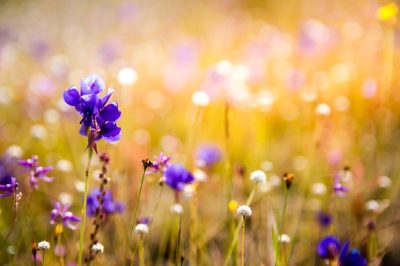by Laxmi Sivaram
Laxmi Sivaram describes her relationship with greenery at various points in her life and how it helped her get through tough times by providing an anchor, a source of inspiration, and acceptance.
Overlooking my small veranda, in a house in suburban Pune, there were two large square patches of green fields. Some cows would come to graze here every day at around the same time of the day in the morning and in the evening. There was comfort in the certainty of their arrival. There was reassurance in the consistency of their attendance. The greenery in front of me made up for what was missing sorely in my life at that time – predictability. My six-year-old mind would worry – what if the cows ate it all up and there was no grass tomorrow? What if the grass did not grow back? But that never happened. The grass would invariably grow back; it was always there.
‘Would I be able to go to school tomorrow?’ was another frequent worry, and that was not an easy question. It depended on whether or not I would have to witness another of my alcoholic father’s angry outbursts or my mother’s hysteria. The fights would go on late into the night at times, and it would be difficult for me to stay awake during class the following day.
Each day would be an ordeal of guessing games I played in my mind. Would he come home drunk today? Did mom have a good enough day at work today for her to stay calm? Unable to bear the uncertainty, I depended on other elements in my environment to provide me the predictability I craved for. I tried to read patterns into the fields in front of my balcony. ‘Today the grass looks lush and green: maybe I can sleep early’; ‘fewer cows today: will I have dinner tonight?’ ‘The grass looks dry and patchy: looks like I should brace for a rough evening.’
I had made a distorted, unrelated connection between what was happening at home and the piece of greenery in front of me. During the monsoons the grass was always a rich, deep green and defied all my prognostications, yet I found a way to rationalize that what was happening around me depended on what was happening in that green patch.
As I grew older, the fields in front of my balcony gave way to four-storey apartments. The soothing, comforting green, which to my younger self signified certainty and permanence, was replaced by an ominous, expressionless white. Although I gradually outgrew my tendency to use the green patch as a portent I would often feel lost as I now had nothing to rely on to predict my father’s eccentricities. The uncertainties and their accompanying anxieties lingered on in my life.
One thing however was certain – that I was never academically inclined and that there was no hope for me. Yes, I was sure of that. I did miserably in school, leaving me distraught and directionless. In college, I would bunk classes and while away time with a group of friends on the sprawling lawns of my college campus. The endless hours on the soft green grass could have been passed off as the vagaries of a carefree spirit or as idiosyncrasies of a careless attitude. Either way, I did not aspire for anything; I did not know how to. I had grown up seeing my father aimless and ambitionless and I simply presumed that I was destined to settle for less. I had decided that I didn’t deserve anything more.
I remember sitting on the lawns in college with my hands folded over my knees and lazily gazing at the Tabebuia trees as they gently dropped one golden blossom after another on the beautiful greenery around me. It was therapeutic to my troubled teenage soul. This green and yellow landscape became the stratosphere I created for myself, away from the shame and embarrassment that came with having an alcoholic father. It gave me the freedom to escape from the situation at home. It kept me sane.
Soon college was over and I started working. It was a night shift at a call center. I didn’t care. I had to do something to make things better for my mother. The routine cogitation over my father’s behaviour was dissolved in the deluge of determination.
After around a year, I got promoted. I got a new role and a day shift. It was early June. The onset of that monsoon was also a new beginning in my career. The rains lashed down and the city looked like it had been painted a fresh green. It was an inexplicable feeling. A mixture of joy, pride and most importantly, hope. I relished the smell of the wet mud and the wet leaves. It was and will forever remain the smell of hope for me. That greenery had a new meaning. It was a picture of my persistence.
Life moved on and a work assignment took me to the UK where I spent around a year. Here was a place where it was perennially raining. Large clouds loomed over the city, drowning it in a massive sheet of grey. At times it would rain incessantly for weeks and the thick gloom would make me feel sad and lonely. In a strange way it reminded me of my grim childhood days full of anxious uncertainly. I longed for the comfort of the greenery that I had resorted to back then. Here, the green around me seemed perpetually covered in white sleet.
After what seemed like an eternal wait, I started seeing early signs of spring. I had another couple of months to go before I returned home. Life had indeed come around. There was a sense of accomplishment. I had achieved a vital objective – my mother didn’t have to work anymore; I could afford her a better life. Countless rows of daffodils lined the streets in streaks of cream, ochre and yellow. I took in as much as my eyes could hold. I wallowed in the subdued brightness of the new spring sunshine. The elusive greenery finally resurfaced and I reveled in the new-found warmth of early success.
Around a year after that I got married and was set to move out of Pune, a thought I could not bear. ‘Bangalore is exactly like Pune,’ I was told by almost everyone who knew I was moving. Back in 2007, it rained practically every day in Bangalore, reminding me of my gloomy UK days. Unwilling to accept the change that had abruptly come into my life, I refused to submit to the unmistakable allure of the city. Years into moving to the city, I longed for the familiar greenery of Pune with the different and layered interpretations I had assigned to it.
My father did not give up drinking till he died on a wet August afternoon in 2011. I didn’t know how to feel. Was I to be relieved that he was not around anymore or be grateful for the little things he did for us in spurts and starts? Was I to continue to be angry with him for the reprehensible childhood he gave me or was I to forgive and let go? I didn’t know where to get my answers.
Six months later, I moved to a new office in North Bangalore. The office floor had imposing windows that commanded an arresting view of the city. As I drew up the blinds one morning, I beheld a profusion of hues which I knew marked the arrival of summer. The trees were in full bloom, spraying colours against the low horizon in shrouds of pink, yellow, lavender and red. This was not just classic greenery, it was verdant tapestry.
There was something about the sweeping exuberance of that sight that disarmed me and catalysed my reconciliation with this city and its array of unexplored possibilities; at the same time, it impelled me to make amends with my repugnant past and the bitter memories I had of my father.
As I stood savoring the resplendent view, I felt a surge inside me. Outlined in that scene, interwoven in asymmetric associations with my thoughts were the colours of acceptance. I didn’t need the answers any more.
Laxmi Sivaram is a freelance Corporate Trainer and a budding Psychotherapist. She is deeply interested in people, behaviour and inter-personal dynamics. She is fascinated by children and intrigued by the way they relate to the world. The eternal optimist, she believes in learning and evolving as a person with each day.







Beautiful